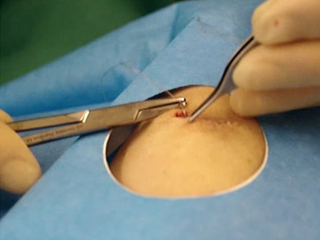Skin Cancer Surgery
Skin cancer is by far the most common of all the different types of  cancers that patients can develop. The incidence, diagnosis and treatment of these cancers has been rapidly growing for many years. Approximately 1 in 5 Americans can be expected to develop some type of skin cancer in his or her lifetime. It is for this reason that we strongly encourage protection from the harmful ultraviolet radiation of the sun and tanning beds, early diagnosis and treatment, an routine screenings whether you are a “high risk” patient or not.
cancers that patients can develop. The incidence, diagnosis and treatment of these cancers has been rapidly growing for many years. Approximately 1 in 5 Americans can be expected to develop some type of skin cancer in his or her lifetime. It is for this reason that we strongly encourage protection from the harmful ultraviolet radiation of the sun and tanning beds, early diagnosis and treatment, an routine screenings whether you are a “high risk” patient or not.
There are many types of skin cancers, however the three most common types are:
1. Basal Cell Carcinoma (BCC)
2. Squamous Cell Carcinoma (SCC)
3. Malignant Melanoma (MM)
Basal Cell Cancer is the most common type of skin cancer found in Caucasians, and when treated early is almost always curative. It is the slowest growing tumor, however, if left untreated for longer periods of time, can be fairly destructive. Larger growths can invade into the surrounding deeper structures of the skin and when neglected, even nerves or bone.
Squamous Cell Cancer is the next most common variant. This type of tumor can also be treated very successfully. It is more dangerous than BCC and does have a higher risk of spreading beyond the confines of what may be involved on the surface of the skin. Although uncommon, it does have the potential to spread, or metastasize, to lymph nodes and distant organs.
Malignant Melanoma is the most dangerous of all skin cancers. It is the most common form of cancer for young adults 25-29 years old. While melanoma comprises less than 2% of all skin cancers, it is responsible for the vast majority of skin cancer deaths. The risk of being diagnosed with MM continues to rise exponentially and is currently approximately 1 in 60 individuals. Again, if detected early the cure rate is very high, however, if left undiagnosed it can metastasize and be life threatening. It is not typically symptomatic, does not necessarily need to be in sun exposed areas, and it can be found without any knowledge from the patient that something may be wrong. Depending upon your risk factors, an annual skin cancer screening is recommended and is extremely important in diagnosing these cancers as early as possible.
Skin Cancer Surgery
Dermatologic surgeons receive specialized training in diagnosing and treating skin cancer, making them the most logical choice to perform skin cancer screening and surgery. There are several modalities for treating skin cancer and determining which is most appropriate depends on a number of variables, from the type of cancer, to the location on the body, the age of the patient, etc. Procedures can range from simple to complex and commonly include cryotherapy, topical chemotherapy, curettage with electrodessication (scraping and cauterizing the cancerous tissue), standard surgical excision with sutures, Moh’s surgery, and radiation therapy. Which of these treatments should be employed is a conversation best left between you and your skin care expert your Dermatologist.




